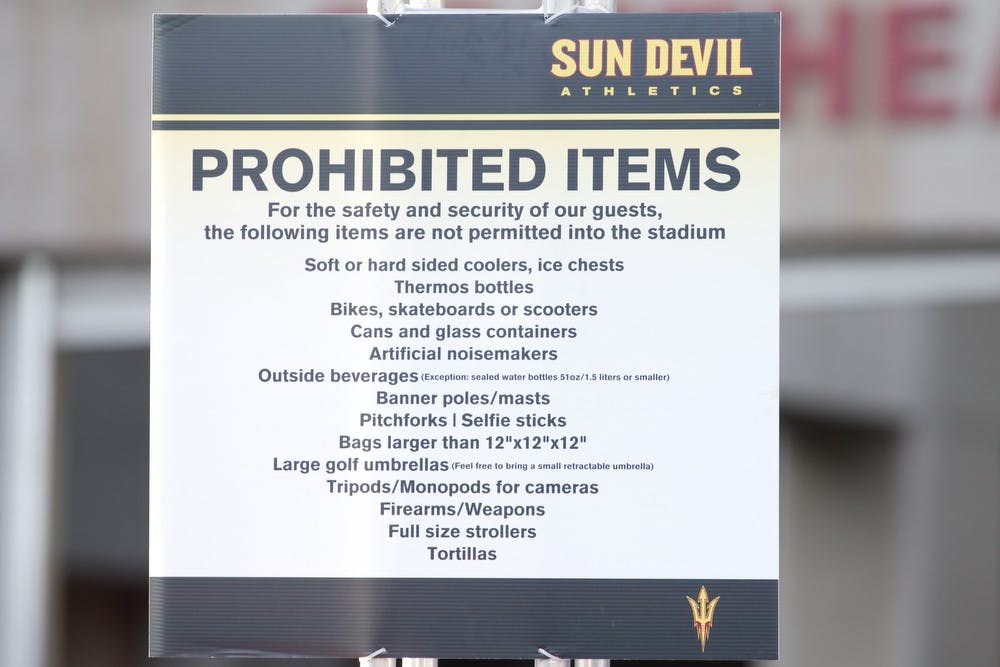Pitchforks, glass containers, outside beverages, firearms — a few of the many items prohibited from entering Sun Devil Stadium. Yet, one item stands out from all the others: tortillas.
It was with a speculative eye that many students glanced at the sign that listed the banned Hispanic food necessity while walking in to the stadium, but Doug Tammaro, director of Media Relations for Sun Devil Athletics, said the story of the tortillas dates back to the late ‘90s.
In 1996, the team was lead by coach Bruce Snyder, and was ranked fourth in college football and ended the season 11-1.
“The year was all fun," Tammaro said. "It was a magical year and everyone was having fun in a lot of different ways."
At the time, Ohio State offensive lineman and future NFL player Orlando Pace gathered fame for his “pancake blocks," a term used to explain how he would flatten the defense. ASU offensive tackle and All-American Juan Roque was compared to Pace, but said this matchup was one for the media alone.
“There was a lot of commentary on ESPN about Orlando Pace and myself,” Roque said. “He was going to be a Hall of Famer, in hindsight, there really was no comparison. Fans took to it about the ‘pancake block’ and ASU said, ‘Well, Roque makes tortilla blocks, and they’re flatter than pancakes.”
Tammaro said Roque became the media’s darling for embracing his Hispanic origins and speaking with the media in Spanish.
As the name grew, so did the student section’s affinity for tortillas. It was at the USC vs. ASU game when the team was 6-0 that the students took the next step — bringing tortillas into the stadium and frisbee throwing them onto the field.
“At first, I had no idea what it was," Roque said. "I thought it was some kids throwing tortillas. Then it was on campus that one of the original throwers … asked me, ‘Hey did you like the tortillas on the field?’ I said, 'Yeah, it was pretty funny.’ He said, 'Those were thrown for you, dude.’”
At first, there were only three to five kids throwing the food, but within three weeks, at Roque’s final home game, Tammaro said there were around 30 students repeatedly tortilla-tossing.
After Roque graduated, the tradition held strong for 13 years.
“For a while people didn’t really notice that they were throwing them or they weren’t hitting the field," Tammaro said. "Basically, those things can fly. Then he graduates and people keep throwing them."
Roque said it was only six years ago that the stadium actually implemented the ban on the tortillas after the referees began discussing penalizing the team for throwing them.
Roque and Tammaro said they were concerned that bottles and other items would start being thrown and that the tortillas resembled penalty flags — hence tortilla's position on a list of items banned for “the safety and security of guests."
Yet ASU isn’t the only university with this sort of ban.
Former UA President Peter Likins waged a long-time war with students in the early 2000s because of a tradition of throwing tortillas at graduation that was controversial.
Texas Tech followed a more parallel tradition of throwing tortillas during the game due to their proximity to a tortilla factory. Like ASU, Texas Tech instituted a ban after the 1995 Cotton Bowl where tortillas rained down on the field, even hitting sports reporters on the scene.
The tradition developed a strong history in Midwest athletics, and, apparently, an even stronger opposition by administration and spectators.
Despite the ASU ban, many current players like sophomore running back Josh Hoekstra still view the tortilla throwing and traditions like it as a core part of the Sun Devil Athletics.
“I feel like traditions like these are very important as an identity to a team and a university. It is something that is unique and special to a program,” Hoekstra said.
Roque holds a similar view to Hoekstra, mixed with a little sentimentality. He specifically recalls while playing for the Detroit Lions in 2002, getting a letter from coach Dirk Koetter inviting him back to the stadium and saying that he thought of Roque every time a tortilla went sailing over his head.
For Roque, the tortillas weren’t just a surprisingly frisbee-like food product, but a connection between the team and its fans.
“Unfortunately, it got banned and students aren’t going to be able to enjoy it," Roque said. "But for the short time it was around, it made the students part of the field, part of the stadium."
Related Links:
11 traditions every ASU student needs to know
Reach the reporter at megan.janetsky@asu.edu or follow @meganjanetsky on Twitter.
Like The State Press on Facebook and follow @statepress on Twitter.




